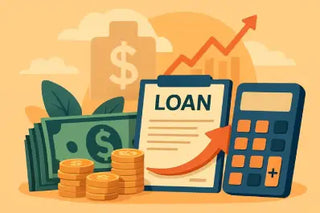Loans are meant to help - whether it’s funding your education, buying a home, or starting a business. But for many borrowers, watching that loan balance grow over time can be frustrating, even alarming.
You might be asking: Why is my loan balance going up instead of down?
In this post, we’ll break down exactly what increases your total loan balance, in plain language. Whether you’re dealing with student loans, personal loans, or credit card debt, understanding these factors can help you avoid paying more than you expected.
1. Accrued Interest: The Biggest Culprit
Interest is the cost of borrowing money—and it starts adding up the moment your loan is issued (unless you're in a grace period).
If you’re not making payments right away (as with many student loans), that interest continues to accrue daily.
How It Works:
| Loan Amount | Interest Rate | Accrues Monthly | New Total After 1 Month |
|---|---|---|---|
| $10,000 | 6% annually | ~$50 | $10,050 |
| $20,000 | 7% annually | ~$116 | $20,116 |
This happens before you’ve even touched the principal. Over time, these small amounts can compound significantly.
2. Capitalized Interest: Interest on Interest
When unpaid interest is added to your principal, it’s called capitalization. This is dangerous because:
-
Your loan balance grows
-
Future interest is now calculated on a higher principal
-
You start paying interest on interest
This often happens:
-
After grace periods (e.g., post-college)
-
After forbearance or deferment
-
When you miss payments
Tip: If you can, pay at least the interest each month—even during deferment. This prevents capitalization.
3. Missed or Partial Payments
Skipping payments doesn’t just risk late fees—it allows interest to build up and eventually capitalizes.
Some lenders also apply your payment to interest first, not principal. So even if you’re making payments, you might not be reducing your actual debt unless you're covering more than the interest.
4. Loan Fees and Penalties
Many loans come with extra costs that can inflate your balance:
| Fee Type | Description |
|---|---|
| Origination Fee | Charged when the loan is issued |
| Late Payment Fee | Applied if you miss due dates |
| Returned Payment Fee | If your payment fails or bounces |
| Collection Charges | For defaulted loans sent to collections |
These fees are often added directly to your balance, increasing the total you owe.
5. Negative Amortization
This happens when your monthly payments are too low to cover the interest. As a result, the unpaid interest gets added to the principal—even if you’re making every payment on time.
This is common with:
-
Income-driven repayment plans (like on student loans)
-
Interest-only mortgage periods
-
Adjustable-rate loans that reset to higher payments
Result: Your balance continues to grow even though you're paying monthly.
6. Loan Consolidation or Refinancing (If Done Wrong)
Consolidating loans can sometimes increase your total balance, especially if:
-
The new loan has a longer term (more interest over time)
-
Capitalized interest from old loans is rolled into the new principal
-
New fees are added
That’s why it’s essential to evaluate whether refinancing is the right move. Use calculators like this compound interest tool to model your future loan costs before making the change.
Example Scenario: What Happens Over 1 Year?
| Month | Activity | Loan Balance |
|---|---|---|
| 1 | Took loan ($15,000 at 6%) | $15,000 |
| 3 | Missed 2 payments | $15,150 |
| 4 | Interest capitalized | $15,370 |
| 6 | Paid only $50/month | $15,450 |
| 12 | Fees + more interest | $15,850+ |
Even without taking on more debt, your loan balance can climb fast without proactive payments.
7. Unfavorable Loan Terms
Sometimes, the loan itself is the problem. Be cautious of loans that include:
-
Variable interest rates (can increase over time)
-
Balloon payments (low monthly payments but one large payment at the end)
-
No interest cap or protections
Read the fine print. Understand how interest is calculated and what events trigger capitalization or fees.
FAQ: Understanding Loan Balance Growth
Q1: Why is my student loan growing even when I’m paying?
You might be in a payment plan that doesn’t fully cover interest, or you’ve had interest capitalized. Check your loan statements for details.
Q2: Can I ask my lender to stop capitalizing interest?
You can’t stop it entirely, but you can prevent it by paying interest during deferments or making payments above the minimum.
Q3: Will paying bi-weekly help?
Yes! Paying half your monthly amount every two weeks equals one extra payment a year—and reduces interest faster.
Q4: Should I refinance to avoid balance growth?
Maybe. Refinancing to a lower interest rate can help, but be sure it doesn’t trigger new fees or a longer payoff timeline that increases total cost.
Final Thoughts
If your loan balance keeps rising, you're not alone—and it’s not always your fault. But the more you understand how loans work, the better positioned you are to stop the bleeding and get back on track.
Small changes today—like making interest-only payments or avoiding unnecessary deferments—can save you thousands in the long run.
Remember, debt doesn't have to be a trap. It can be a tool—if you stay in control of it.
